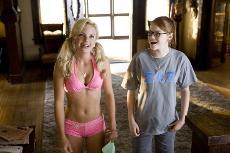By Bill Molina

(Sony Pictures)
By Bill Molina
In “The House Bunny,” Anna Faris plays the role of Shelly Darlingson, a playboy model who gets kicked out on the street after turning 27.
Stumbling upon the Zeta Alpha Zeta sorority house, she decides to help the girls change their image so they can gain the thirty pledges they need to not be shut down.
Faris portrays the most airheaded girl imaginable, this is showcased in bad jokes that could obviously be seen coming from miles away.
Her perpetual innocence and bubbly nature are matched by the blank and clueless expressions that often accompany such ditzy repartee.
Having a pet cat named Pooter is an old bit that lacks any kind of originality; it would have been funnier to have a pet turtle named Hank.
Emma Stone (“Superbad”) plays the role of Natalie, the leader of the sorority, a highly enthusiastic and overly nerdy girl whose annoying manners seem to be the most authentic part of the movie.
The remaining Zeta sisters are played by “Cheetah Girl” Kiely Williams, “American Idol” star Katherine McPhee and Hollywood heir Rumer Willis.
Also making an appearance as Natalie’s crush Colby is Tyson Ritter, lead singer of The All-American Rejects.
The rest of the sorority girls are a mixed bag of clichés that walk behind these two the whole film, until the obligatory montage where they all remove their glasses and the audience realizes that they were beautiful all along!
Pesky glasses, where the documentary blowing the lid off of the glasses-reducing-sexual-attraction-in-modern-society is, I’ll never know.
Shelly teaches the sorority girls how to get over their inability to socialize with the opposite sex.
None of them can grasp the idea, especially the girl who is in her third trimester of pregnancy. Explain that to me, because the film certainly does not.
The Zeta girls are all supposed to be smart, yet they are as dim-witted as Shelly in many ways.
You might figure they may have taken some speech or sociology classes, which might sit them next to other people, who they’d have to actually talk to.
Yet it seems that they have never even stood in the same room with a male.
Colin Hanks (“Orange County”) plays Oliver, the nice guy love interest for Shelly, whom we see go out on one date, all of which is spent trying to portray herself as smarter than she truly is.
It is worth noting that you never see the two truly connect on anything, yet he still falls for her somehow.
It’s a wonder how late in the process they added on this hack plot device, mainly because all of his character’s involvement in the movie seems incredibly unbelievable.
When the antagonist comes along to shut down the sorority house, she tells Shelly to leave because she is too much of a negative influence.
I would have to admit that I agree with her.
Most of this film’s message seems to be that selling your sexuality can get you what you want.
It is only at the very end of the movie where it awkwardly changes gears into a beautiful-on-the-inside-all-along message that has no heart behind it whatsoever.
Not surprisingly this movie is rated PG-13, so teen boys can check out scantly clad women for 90 minutes, and teen girls can realize how much you can achieve through wearing such little clothing.
While Faris delivers her lines well and on cue, she still comes off as a terrible actress, and one that lacks any kind of true comedic talent in any role, at all, ever, forever, plus one.
How she continues to land lead roles perplexes me.






